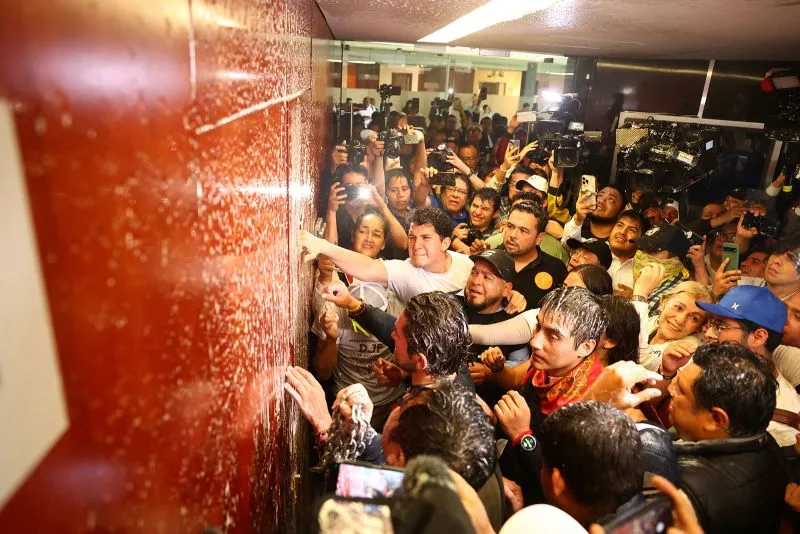Mexico’s Senate Disrupted by Protesters Amid Judicial Reform Debate

Mexico's Senate Chaos Amid Judicial Reform Debate
Mexican lawmakers were forced to suspend debate on a controversial judicial reform after protesters broke down the doors of the Senate building and forced their way into the upper house’s session hall. A vote on the sweeping constitutional reform – which would see Mexicans elect judges at all levels of government by popular vote – was expected after the debate.
As the crowd broke into the upper house on Tuesday, Senate President Gerardo Fernandez Noroña asked his colleagues to evacuate the hall to avoid confrontations with the protesters. Noroña has since ordered the Senate to resume debate at 7 p.m. local time (9 p.m. ET) at another venue, the former Senate headquarters, in Mexico City.
Dramatic footage of the scene showed protesters banging on the doors of the chamber while others waved the Mexico flag from a gallery above the floor of the Senate. Some lawmakers were seen cheering on the demonstrators.
Controversy Surrounds Proposed Changes
The sweeping constitutional reform is championed by Mexican President Andrés Manuel López Obrador, who has long criticized his country’s Supreme Court after it stood in the way of some of his signature policy proposals. The overhaul, once passed, would see Mexicans select judges at all levels of government through elections, a procedure that legal experts say would turn Mexico into an international outlier.
The reform sailed through the lower chamber of Congress last week, but López Obrador's ruling coalition needs a supermajority to approve it in the upper house. Speculation has mounted that an opposition senator has changed allegiance to the ruling bloc, which means the reform could potentially pass by a razor-thin majority.
The bill has faced rare and stinging critique from US Ambassador Ken Salazar in Mexico City, who called the election of judges “a major risk to the functioning of Mexico’s democracy”. His comments led to an international spat between the countries. Warnings from business groups that the reform could undermine the Mexican investment environment have sent the value of the peso tumbling.
López Obrador, a popular leftist, claims the overhaul is necessary to rid Mexico’s judiciary of corruption and ensure it is responsive to popular will. Critics of the reform see it as a power grab that will expose one of the last remaining checks on presidential power to political influence.
Supreme Court judges in Mexico are usually nominated by the president and must be approved in the Senate. If passed, the reform would lead to judicial elections, which would take place next year after a period of campaigning; about 7,000 judges would be required to battle for their seats or yield their gavel to the most popular candidate.
This overhaul comes as López Obrador’s political movement grows. His protege, Claudia Sheinbaum, was elected president by a landslide in June and supports judicial reforms, contesting claims that the reform will concentrate power for her ruling party, Morena.
This article was prepared using information from open sources in accordance with the principles of Ethical Policy. The editorial team is not responsible for absolute accuracy, as it relies on data from the sources referenced.